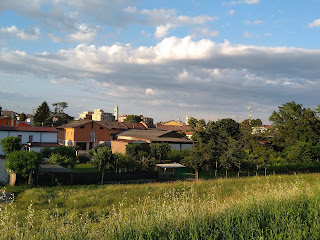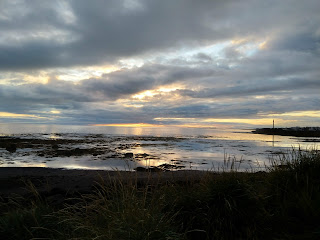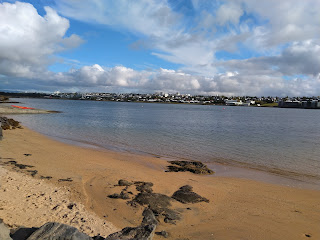Ann Arbor, Michigan is a place, the place, to which my sense of home is most closely tied. I grew up in Ann Arbor from the day I was born until the age of nineteen, when I moved away to start college in Beloit, Wisconsin. It’s the place where my sense of what home means in general and specifically to me were first developed.
A year after I started college, my family moved away from Ann Arbor to St. Louis, Missouri, and since then, I have not felt whole. I felt extremely connected to Ann Arbor, especially after reevaluating my own relationship to it and my sense of home there following a few exchange programs on which I embarked during high school. The sense of wholeness I felt by living in the place where I grew up my whole childhood and adolescence, the sense of connection it gave me to my past while still cultivating a rich present in the same place, is a giant hole that I have not been able to fill in the intervening time, no matter how hard I try or what I do.
In Ann Arbor, the simplest and most banal of things seem inherently more familiar. The particular cerulean tint of the sky during late spring afternoons when the days grow long. The union of the specific bird species of the surrounding area fusing into a unique, locally crafted melody. The reflections of pale, fluffy clouds over the swiftly moving waters of the Huron River. The color of the freshly grown May leaves and the sweet scent of their blossoms. Even though there’s nothing specific or drastic which truly sets apart the terrain on which the lines between Michigan, Ohio, Indiana, and other adjacent states and neatly defines them into the pockets of division we see on a map, somehow there’s an instant, palpable change that I not only feel, but also see, any time I cross over those state lines while returning to Michigan. To someone who grew up there, it just is, and is plain to see.
Seeing and being are not simple or static actions for me in Ann Arbor. When one returns to a place one lived in for so much of one’s life and formed such a massive part of one’s sense of self, it is not possible to simple see and be. Every action, every movement, every sight, is beset by remembering. The act of remembering is a state of constant navigation through spaces familiar from years of proximity, that have grown alien from just a few of prolonged absence. The familiarity comforts - one is reminded of all that has transpired in the spaces and the happy feelings of the memories and interactions they conjure. But they also estrange and alienate - the unfamiliarity, and the comparatively short period of time in which they have mushroomed into existence serve to sadden, and deepen the gap between the place, and the familiarity of the life left behind. They feed off of each other and work their way back and forth into otherwise ordinary actions and transitions, deepening the feelings of separation from the formerly unchallenged and unobstructed sense of home, and the frustration at the very nature of this disconnect. They accentuate rootlessness.
No matter how badly you may wish to leave in your youth, no matter how limiting, droll, or stifling it may seem at the time for any number of reasons, moving away from the place that you grew up effectively your entire childhood and adolescence is not easy. The very nature of this action necessitates a farewell to a cherished part of life that is more or less permanent, a severance from how unchallenged and permanent one’s sense of home and security used to be, that can never be wholly restored.
I know this is at least the case for me when I visit Ann Arbor. At this point, with my family having moved away over three years ago, I am fully aware of this severance every time I come to visit. I have already been since the first time I returned after we left, as the stark difference made itself clear almost right away. Being a guest at friends’ houses, welcome and relaxed, but ostensibly a visitor to my own hometown, was deeply disorienting, as having to shift my sense of center and direction to their homes instead of my own changed the whole feeling of being back in the first place. Every visit brings different experiences with it - I see many of the same people again, who I’ve known practically all my life, and reconnect or disconnect with them on various different levels. Sometimes I feel truly in my element and being back restores me in a way few other things can; for split seconds I’ll forget that I ever left, and I feel like I have my old life back. Others I feel lonely and utterly disconnected from any sense of my old life, deeply nostalgic for the sense of home and belonging that once fully surrounded me there, and is now gone. Each time I go back, I never know which it will be.
Every time I return, I do my very best to lose myself in Ann Arbor, to search far back in my mind and memories and reconstruct them into a tangible contemporary imitation that I can access and feel like I’m back again. I try to lose myself in downtown, and remember dinners there with my family at our favorite Indian and Middle Eastern restaurants, and wandering around the Summer Fest, once called (and still colloquially known as) “Top of the Park” with my high school friends on cool summer nights. I try to lose myself in the variable seasonal beauty of all my favorite parks - the County Farm, Gallup, Kensington State Park a while further outside of town - and their introspective natural retreats. I try to lose myself in the winding and often confusing streets of Ann Arbor Hills, the neighborhood I grew up in, which have earned it the nickname of “Spaghettiland,” and try to imagine for a moment that I’m back again in the life I once lived, that once again I’m just going for a walk around the block in between lessons or homework assignments or just to do something and get some fresh air out of the house.
Being back is like reassembling the familiar pieces of a beautiful puzzle that have been taken far apart from one another and tainted with some harsh substance. The image is still fundamentally the same, but it’s damaged and pixelated, beautiful in its own right, although it’s different, but irreparably and unmistakably not the same.
And although it may hurt when the washed out, stained elements of the new image override its original beauty, the image is too important and beautiful not to reassemble. I will continue returning to reassemble it for the rest of my life. Sometimes with greater success than others. But always with an earnest and optimistic commitment to remembering and paying tribute to all the places, people, things, and experiences in Ann Arbor that shaped me into who I’ve been, who I am, and who I’ll be.
A year after I started college, my family moved away from Ann Arbor to St. Louis, Missouri, and since then, I have not felt whole. I felt extremely connected to Ann Arbor, especially after reevaluating my own relationship to it and my sense of home there following a few exchange programs on which I embarked during high school. The sense of wholeness I felt by living in the place where I grew up my whole childhood and adolescence, the sense of connection it gave me to my past while still cultivating a rich present in the same place, is a giant hole that I have not been able to fill in the intervening time, no matter how hard I try or what I do.
In Ann Arbor, the simplest and most banal of things seem inherently more familiar. The particular cerulean tint of the sky during late spring afternoons when the days grow long. The union of the specific bird species of the surrounding area fusing into a unique, locally crafted melody. The reflections of pale, fluffy clouds over the swiftly moving waters of the Huron River. The color of the freshly grown May leaves and the sweet scent of their blossoms. Even though there’s nothing specific or drastic which truly sets apart the terrain on which the lines between Michigan, Ohio, Indiana, and other adjacent states and neatly defines them into the pockets of division we see on a map, somehow there’s an instant, palpable change that I not only feel, but also see, any time I cross over those state lines while returning to Michigan. To someone who grew up there, it just is, and is plain to see.
Seeing and being are not simple or static actions for me in Ann Arbor. When one returns to a place one lived in for so much of one’s life and formed such a massive part of one’s sense of self, it is not possible to simple see and be. Every action, every movement, every sight, is beset by remembering. The act of remembering is a state of constant navigation through spaces familiar from years of proximity, that have grown alien from just a few of prolonged absence. The familiarity comforts - one is reminded of all that has transpired in the spaces and the happy feelings of the memories and interactions they conjure. But they also estrange and alienate - the unfamiliarity, and the comparatively short period of time in which they have mushroomed into existence serve to sadden, and deepen the gap between the place, and the familiarity of the life left behind. They feed off of each other and work their way back and forth into otherwise ordinary actions and transitions, deepening the feelings of separation from the formerly unchallenged and unobstructed sense of home, and the frustration at the very nature of this disconnect. They accentuate rootlessness.
No matter how badly you may wish to leave in your youth, no matter how limiting, droll, or stifling it may seem at the time for any number of reasons, moving away from the place that you grew up effectively your entire childhood and adolescence is not easy. The very nature of this action necessitates a farewell to a cherished part of life that is more or less permanent, a severance from how unchallenged and permanent one’s sense of home and security used to be, that can never be wholly restored.
I know this is at least the case for me when I visit Ann Arbor. At this point, with my family having moved away over three years ago, I am fully aware of this severance every time I come to visit. I have already been since the first time I returned after we left, as the stark difference made itself clear almost right away. Being a guest at friends’ houses, welcome and relaxed, but ostensibly a visitor to my own hometown, was deeply disorienting, as having to shift my sense of center and direction to their homes instead of my own changed the whole feeling of being back in the first place. Every visit brings different experiences with it - I see many of the same people again, who I’ve known practically all my life, and reconnect or disconnect with them on various different levels. Sometimes I feel truly in my element and being back restores me in a way few other things can; for split seconds I’ll forget that I ever left, and I feel like I have my old life back. Others I feel lonely and utterly disconnected from any sense of my old life, deeply nostalgic for the sense of home and belonging that once fully surrounded me there, and is now gone. Each time I go back, I never know which it will be.
Every time I return, I do my very best to lose myself in Ann Arbor, to search far back in my mind and memories and reconstruct them into a tangible contemporary imitation that I can access and feel like I’m back again. I try to lose myself in downtown, and remember dinners there with my family at our favorite Indian and Middle Eastern restaurants, and wandering around the Summer Fest, once called (and still colloquially known as) “Top of the Park” with my high school friends on cool summer nights. I try to lose myself in the variable seasonal beauty of all my favorite parks - the County Farm, Gallup, Kensington State Park a while further outside of town - and their introspective natural retreats. I try to lose myself in the winding and often confusing streets of Ann Arbor Hills, the neighborhood I grew up in, which have earned it the nickname of “Spaghettiland,” and try to imagine for a moment that I’m back again in the life I once lived, that once again I’m just going for a walk around the block in between lessons or homework assignments or just to do something and get some fresh air out of the house.
Being back is like reassembling the familiar pieces of a beautiful puzzle that have been taken far apart from one another and tainted with some harsh substance. The image is still fundamentally the same, but it’s damaged and pixelated, beautiful in its own right, although it’s different, but irreparably and unmistakably not the same.
And although it may hurt when the washed out, stained elements of the new image override its original beauty, the image is too important and beautiful not to reassemble. I will continue returning to reassemble it for the rest of my life. Sometimes with greater success than others. But always with an earnest and optimistic commitment to remembering and paying tribute to all the places, people, things, and experiences in Ann Arbor that shaped me into who I’ve been, who I am, and who I’ll be.


















































































































































































